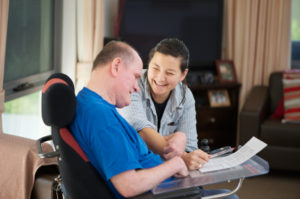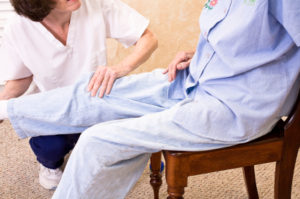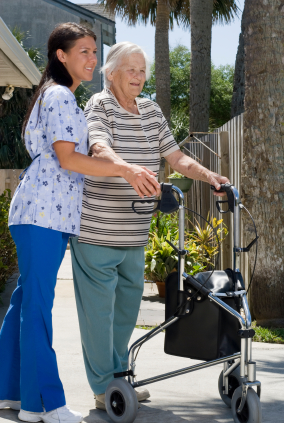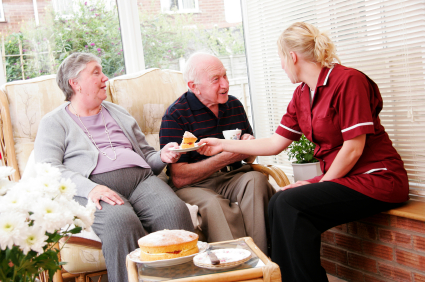 Home nursing services are required for a variety of reasons. Senior citizens are the largest consumer of home care services. Individuals recovering from acute injury, those adjusting to physical and mental disabilities, and individuals with social challenges can also benefit from home nursing services. As stays in the hospital decrease in length, home nursing can play a critical role in the full recovery from surgery and other medical procedures. Anytime a person needs ongoing care that can’t safely, easily or effectively be provided by family, friends or other lay-persons, the skills and expertise of an in-home, private duty nurse may be necessary. Home nursing services are also a key part of hospice, end-of-life care. In home nurses provide care for people who are recovering from injury, disabled, chronically or terminally ill or in need of medical assistance and in some cases assistance with activities of daily living. While home health nurses were once somewhat of a luxury, home care has become an essential aspect of today’s healthcare system.
Home nursing services are required for a variety of reasons. Senior citizens are the largest consumer of home care services. Individuals recovering from acute injury, those adjusting to physical and mental disabilities, and individuals with social challenges can also benefit from home nursing services. As stays in the hospital decrease in length, home nursing can play a critical role in the full recovery from surgery and other medical procedures. Anytime a person needs ongoing care that can’t safely, easily or effectively be provided by family, friends or other lay-persons, the skills and expertise of an in-home, private duty nurse may be necessary. Home nursing services are also a key part of hospice, end-of-life care. In home nurses provide care for people who are recovering from injury, disabled, chronically or terminally ill or in need of medical assistance and in some cases assistance with activities of daily living. While home health nurses were once somewhat of a luxury, home care has become an essential aspect of today’s healthcare system.
People today are living longer lives; in fact there are over 9 million seniors over the age of 80 years old in the U.S. today. This can present a unique set of challenges for seniors and those who love them, as they must navigate the challenges of aging in today’s society. Home care can play a critical role in maintaining health and wellness within the senior population. Seniors in good health may require home nursing services when recovering from an injury, especially one that affects mobility. Elderly patients recovering from slip-and-fall accidents, car accidents, surgical procedures and medical events such as heart attacks and strokes often require home nursing services. The skilled oversight of a qualified in home nurse can help coordinate care and speed recovery for seniors.
 Regardless of age, anyone can fall victim to an injury or illness which requires a rehabilitation program. The goal of rehabilitation programs is to maximize the patient’s ability to function during the recovery process while also promoting a return to healthful functioning. Individuals dealing with paralysis, loss of limb, fractures, joint replacement, frailty, mobility issues and other illnesses that impede normal physical functioning of the body can benefit from home nursing services with a focus on rehabilitation. In home nurses can also provide guidance and instruction on the use of mobility aids. Care of this type is usually implemented by a team of care providers under the skilled guidance of a home nursing care coordinator.
Regardless of age, anyone can fall victim to an injury or illness which requires a rehabilitation program. The goal of rehabilitation programs is to maximize the patient’s ability to function during the recovery process while also promoting a return to healthful functioning. Individuals dealing with paralysis, loss of limb, fractures, joint replacement, frailty, mobility issues and other illnesses that impede normal physical functioning of the body can benefit from home nursing services with a focus on rehabilitation. In home nurses can also provide guidance and instruction on the use of mobility aids. Care of this type is usually implemented by a team of care providers under the skilled guidance of a home nursing care coordinator.
Home nursing services are often a main component of end-of-life care and hospice care. This special type of care allows patients to remain at home, with their family and friends as they live out their final days. This type of home nursing care focuses on pain relief and symptom control for the patient. In home nurses also provide emotional and psychological support to the patient and their family members and coordinate other services such as those of home health aides, social workers, nutritional specialists and pastoral counselors. Home hospice care allows patients to remain independent and comfortable in their own familiar surroundings. In many cases hospice care administered by in home nurses is less expensive than end-of-life hospitalization.
 Depending on insurance providers, an individual may need to qualify as “home bound” in order for home nursing services to be considered a covered benefit. Being “home bound” doesn’t necessarily mean that the person can never leave their residence; individuals may leave their home occasionally for reasons such as attending church services, funerals, and other family functions while being driven by another person. To qualify as “home bound” patients typically have a condition or injury that greatly restricts their ability to leave the home unless they use an assistive device such as a wheelchair, walker, cane or crutches. Patients who cannot leave the home without the use of special transportation, without the assistance of another individual, or those for whom leaving the home is not medically advised also qualify for “home bound” accommodations in terms of home care and home nursing services. “Home bound” patients can also leave home to attend licensed adult day care programs, and for medical treatments such as kidney dialysis, chemotherapy and radiation therapy, and for outpatient physical and occupational therapeutic services.
Depending on insurance providers, an individual may need to qualify as “home bound” in order for home nursing services to be considered a covered benefit. Being “home bound” doesn’t necessarily mean that the person can never leave their residence; individuals may leave their home occasionally for reasons such as attending church services, funerals, and other family functions while being driven by another person. To qualify as “home bound” patients typically have a condition or injury that greatly restricts their ability to leave the home unless they use an assistive device such as a wheelchair, walker, cane or crutches. Patients who cannot leave the home without the use of special transportation, without the assistance of another individual, or those for whom leaving the home is not medically advised also qualify for “home bound” accommodations in terms of home care and home nursing services. “Home bound” patients can also leave home to attend licensed adult day care programs, and for medical treatments such as kidney dialysis, chemotherapy and radiation therapy, and for outpatient physical and occupational therapeutic services.
Home care has grown to be a crucial part of today’s healthcare industry. The skills of a home health nurse can greatly improve quality of life for a wide range of patients including senior citizens, individuals dealing with injuries that need rehabilitation services, as well as those partaking of hospice services.

